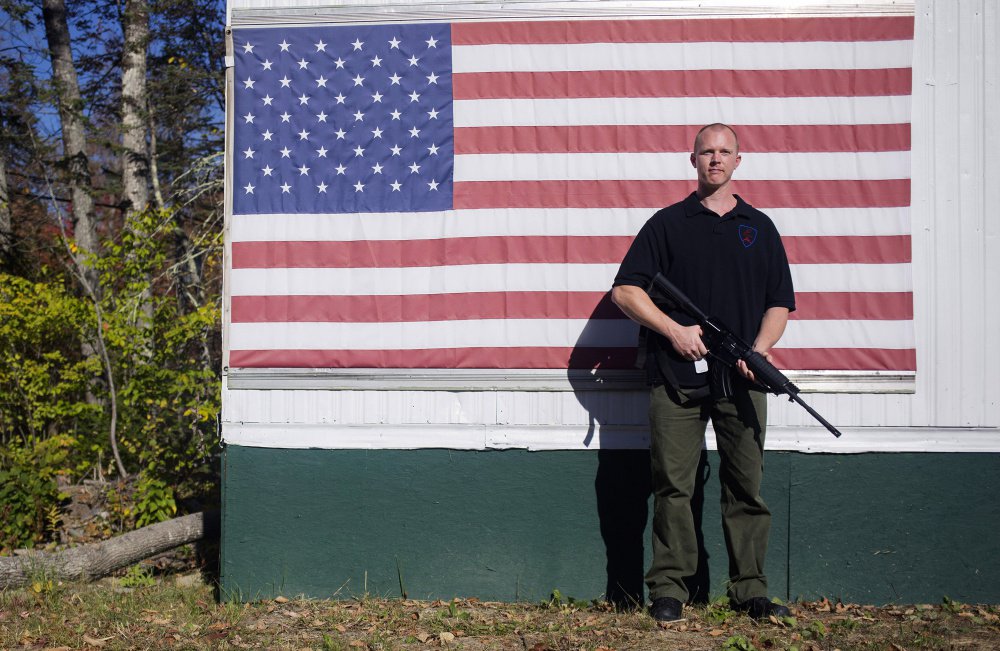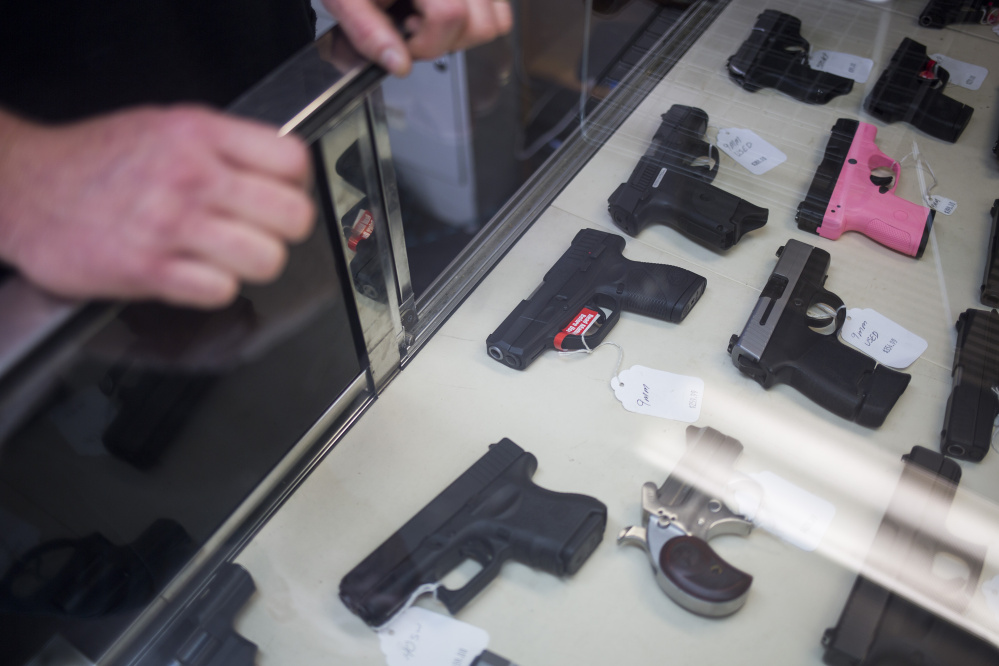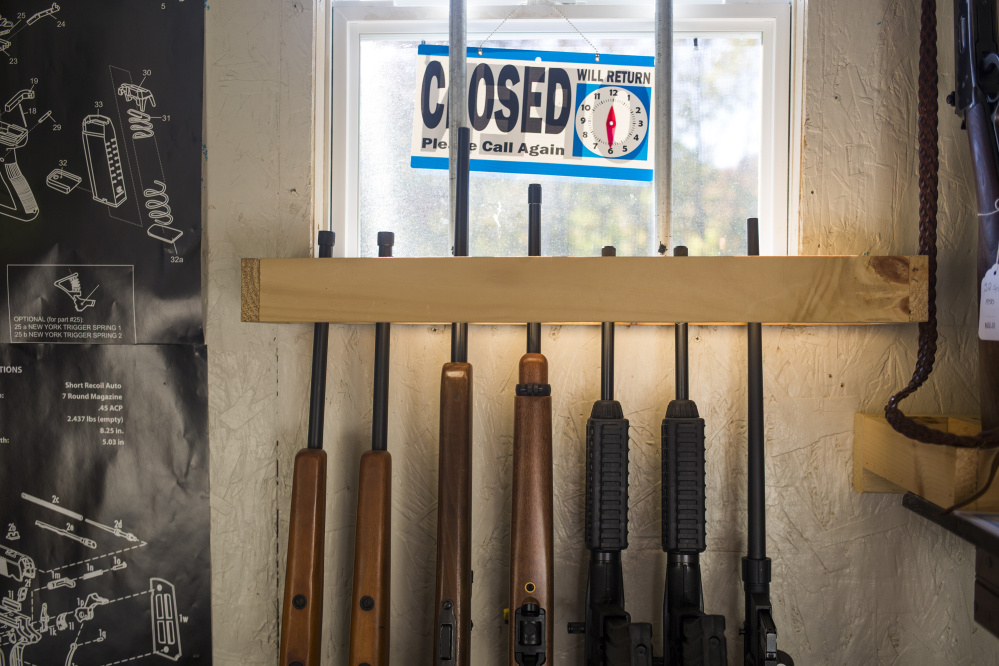Since 1998, the FBI has conducted nearly 1.1 million background checks on would-be buyers at Maine gun dealers, searching for a felony conviction or other red flags.
More than 5,500 people failed the initial test.
But South Portland Police Chief Edward Googins knows that is an incomplete picture. Every year, untold numbers of guns change hands privately in Maine in a vibrant, underground gun marketplace, all legally flying under the radar of the federal background check system.
“The whole issue about background checks in the state – and I look at it really from both a law enforcement perspective and a common sense perspective – is you can’t have two different systems for purchasing guns,” said Googins. “It just doesn’t work. Because if there is a system that requires checks, and you can’t pass a background check, you’re going to go to the other system.”
Question 3 on the November ballot aims to close what Googins and others see as a dangerous loophole in Maine law that could allow convicted felons, the mentally ill or other “prohibited persons” from easily buying a gun in the private market without undergoing a background check. They point to crimes committed in Maine with guns that changed hands on the private market or to gun trafficking incidents where firearms from Maine ended up on the streets of Boston or other towns in Massachusetts, where the gun laws are much stricter.
Opponents dismiss it as a “feel-good” measure, predicting that mandating background checks for private sales as well as for gun loans that will do nothing to stop crime while unnecessarily burdening law-abiding Mainers. They also accuse out-of-state gun control groups of pushing a measure that will add costs, paperwork and legal uncertainties to the long tradition in gun-friendly, outdoorsy Maine of neighbors and friends lending each other hunting rifles or other guns.
“Universal background checks are a failed, New York City solution to a problem that Maine doesn’t have,” said Todd Tolhurst with Gun Owners of Maine, a citizen advocacy group.
A GOOD SHOT AT PASSING
If passed by Maine voters – and polls suggest it has majority support – the initiative would make Maine one of nine states that would require background checks for nearly all firearm sales, including private transactions.
It is impossible to determine the size of Maine’s private gun market simply because it is entirely unregulated. Neither buyers nor sellers are obligated to notify law enforcement about the sale, and Maine has does not have a registry or a mandatory permitting system for gun owners.
The most ambitious attempt at gauging the size of Maine’s private gun marketplace was undertaken by Everytown for Gun Safety, the New York City-based group that has bankrolled much of the Question 3 campaign and a similar ballot initiative on Nevada’s fall ballot.
Everytown estimates that nearly 3,000 firearms are advertised for sale annually by private sellers in Maine on the two most popular classified listings, the weekly shopper Uncle Henry’s and the national website ArmsList.com. That figure is based on a review of Uncle Henry’s publications between May 2012 and January 2016 as well as ads on ArmsList.com during that period.
“This unregulated market makes it all too easy for criminals and domestic abusers who are barred from buying a gun by federal law – people who would fail a background check if they tried to buy a gun from a licensed dealer – to easily avoid a background check altogether,” said Sarah Tofte, research director for Everytown for Gun Safety, which was created by former New York City Mayor Michael Bloomberg. “From our past research, we know that criminals and domestic abusers are well aware of this type of unlicensed sale loophole – and they actively exploit it.”
Yet both Everytown and Tolhurst, the gun rights advocate, said that figure is likely well below the actual figure.
FBI data from the National Instant Criminal Background Check System showed that Maine ranked squarely in the middle – 26th among the 50 states – for the number of names run through NICS last year, although again those figures do not include private sales. The 94,744 background checks processed by the FBI in 2015 equaled one check for every 14 residents, compared to one check for every 1.4 residents of Kentucky (the highest) and one for every 99.5 New Jersey residents.
OPPOSITION FROM SHERIFFS
Two states that adopted similar background check expansions in recent years could provide additional context – or could further muddy the picture.
Since Colorado expanded background checks in January 2015 and August 2016, the Colorado Bureau of Investigation’s InstaCheck Unit conducted 30,290 checks on private sales. Those checks accounted for 5.1 percent of the nearly 600,000 firearms-related background checks conducted in Colorado during that time and resulted in 651 denials of sale, according to state statistics.
In Oregon, by contrast, private sales accounted for just 1.1 percent of the 318,000 checks conducted there since that state began mandating background checks in August 2015. And those reviews resulted in only 15 denials, according to data from the Oregon State Police.
It is unclear why the two states would have such a large disparity, although Colorado’s “private sales” figures appear to include sales at gun shows.
As in Maine in 2016, the issues were also intensely controversial in Colorado and Oregon. In Colorado, for instance, the vast majority of county sheriffs joined an unsuccessful lawsuit to overturn a law they said was unenforceable, with some sheriffs vowing to ignore the law altogether.
Maine’s law enforcement community is also split on Question 3.
The ballot initiative has been endorsed by the 350-member Maine Chiefs of Police Association, of which South Portland’s Googins is president.
“While no law can prevent every crime, this ballot measure will make Maine a safer place,” Falmouth Police Chief Edward Tolan said at the time of the announcement last month. “Maine has a strong tradition of responsible gun ownership and respect for the Second Amendment. Question 3 honors both of those values.”
Yet 12 of Maine’s 16 elected sheriffs signed a letter last week opposing Question 3.
“We live in one of the safest states in the country and strongly believe no provisions in this legislation would reduce gun violence or crime in Maine,” reads a letter signed by the 12 sheriffs. “In fact, Question 3 is unenforceable, confusing, poorly written and threatens to make law-abiding gun owners into criminals for simply loaning a firearm to a friend.”
SALES PITCH PACKS FIREPOWER
Uncle Henry’s, the weekly classified shopper where Mainers shop for anything and everything used, has long been a major resource for gun buyers and sellers.
Shoppers can find anything from antique muskets to brand new 9mm handguns, not to mention the controversial AR-15 rifles that have become a lightning rod in the debate over gun control because of their use in multiple mass shootings. And some sellers aren’t shy about using Question 3 as part of their pitch.
“Buy it now without an FFL in case the Libs get their way with Question 3,” wrote one seller of an assault-style rifle, referring to the requirement under Question 3 that all sales have background checks conducted by a “federal firearms license” holder, or FFL.
“Prices will go higher as election day gets closer buy now before its gone!” wrote another seller of an AR-15.
Opinions are divided on Question 3 even among aficionados of the popular weekly swap mag.
Tim Hendsbee, a 34-year-old Levant resident, began using Uncle Henry’s years ago to buy and sell guns for his personal collection and still uses it to boost business for his new sales and gunsmithing shop in Levant, H.F. Firearms. A veteran wounded in Iraq while deployed with the Maine Army National Guard’s 133rd Engineer Battalion, Hendsbee now must run background checks on every buyer because he is a federally licensed dealer. He also offers to run background checks for private sellers or transfers for $20.
But Hendsbee opposes Question 3 because, he said, it would meddle with a long-standing cultural tradition in Maine and New England in which friends, neighbors and family members lend firearms to each other for hunting or other purposes. Under Question 3, family members down to first cousins would be exempt from background checks for “transfers.” Any transfers among non-relatives would have to undergo a background check first unless the lender plans to hunt in the presence of the other person.
Hendsbee said the ballot proposal will make law-abiding citizens jump through hoops and won’t stop the people intent on getting around the law.
“I think people are still going to find a way to get firearms and get them illegally,” Hendsbee said. “There are still going to be people willing to sell to them on the black market.”
In a possible indication of the sensitivity over the gun debate, some private sellers also make clear that they will require a background check or will only sell to someone who holds a concealed weapons permit, which requires a background check.
Among them is Harold Elliott, an Auburn resident who estimated that he has bought or sold 20 firearms through Uncle Henry’s over the years. In a recent ad for a 9mm handgun, Elliott specified that any buyer “must be Maine resident, not a felon or restricted from owning a firearm, and required to show positive ID and sign a bill of sale.” Elliott said he asks buyers if they are restricted from buying a firearm and often demands a concealed weapons permit.
“I wouldn’t sell to any Tom, Dick or Harry,” Elliott said. “I want to be sure.”
Elliott supports Question 3 and feels there is “nothing wrong” with requiring background checks on all gun sales, calling it a “common sense” move to keep guns away from criminals, terrorists or individuals with mental illness who should not possess a gun.
“Why should that bother anybody?” said Elliott, a lifelong hunter now in his upper 70s. “If you have nothing to hide and are a legitimate citizen and are not a criminal? I don’t know why people are fighting that.”
STRAW SALES OUT OF SIGHT
A poll of more than 500 likely Maine voters conducted in September for the Portland Press Herald showed that 61 percent supported Question 3, with 33 percent opposed and 6 percent undecided. Supporters also have an enormous fundraising advantage over opponents thanks, in large part, to the more than $4 million funneled into Mainers for Responsible Gun Ownership – the pro-Question 3 ballot question committee – by Bloomberg’s Everytown for Gun Safety.
Opponents, backed by the National Rifle Association, continue to portray Question 3 as an out-of-state campaign seeking to impose unnecessary burdens on Mainers who buy, sell and use guns responsibly.
Tolhurst, with Gun Owners of Maine, and other opponents, also suggest that the FBI’s background check figures are inflated because a certain percentage of people are wrongly rejected by the system. But he said the biggest source of crime guns is “straw purchasers” – people able to pass background checks who illegally buy guns for prohibited persons.
“The problem is no one has ever determined how to eliminate straw sales,” Tolhurst said. “The federal government has been trying for years and years and years, and there’s no way to do it.”
Gun control advocates disagree. Several attempts to strengthen federal laws to discourage straw purchases have been proposed but failed in Congress in recent years.
Googins, the South Portland police chief, said it is “not uncommon” for history traces on crime-related or recovered guns to “dead end simply because of a private sale” without a background check. That was even the case with the gun used to severely injure a South Portland Police Department officer during a 2006 shootout.
“It just makes sense,” Googins said of expanded background checks. “I’m a gun owner. I own many guns and there is no way I would sell any of my guns to anyone without first checking to ensure that they are able to purchase it.”
Send questions/comments to the editors.





